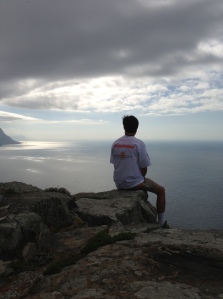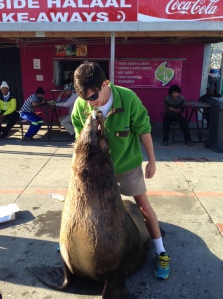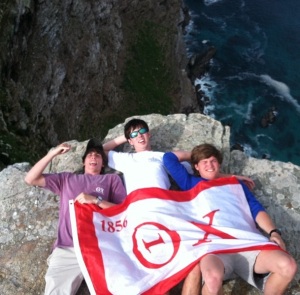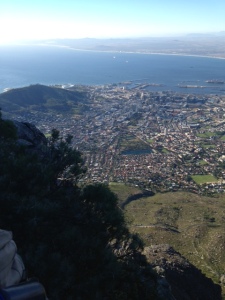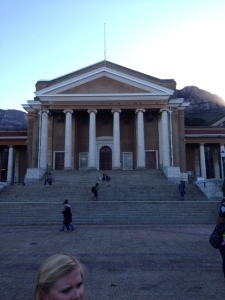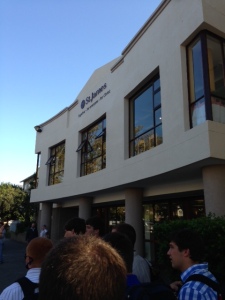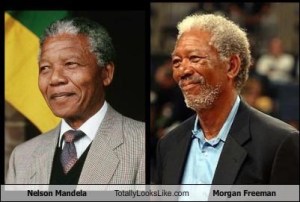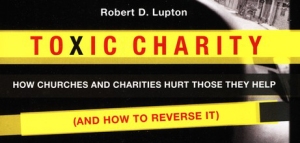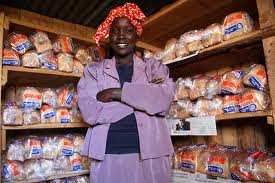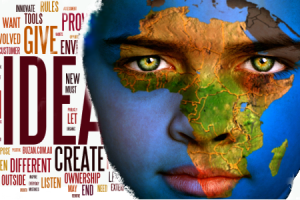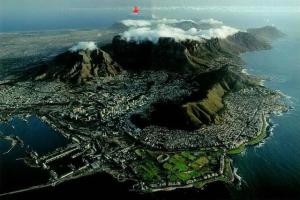Choosing to go to South Africa a few weeks ago was truly one of the best experiences of my life. I know any English professor would be ashamed of a topic sentence like this, but there is honestly no simpler way to put it. I think it still blows my mind that just a few weeks ago I was halfway across the world, in a completely different culture, yet some parts of me felt completely at home. I could not have been luckier throughout the whole experience and I hope that I can have more opportunities even remotely as influential as this one later in life.
Way back at the beginning of the semester I remember talking to Will Varner as he told me he was going on a Maymester to South Africa and I remember thinking that will definitely be a fun trip with a Varner along. Then I heard from a few other of my close friends that they were thinking about going. That’s when I knew this was a once in a lifetime experience that I needed to partake in. Little did I know I greatly underestimated it at the time.
As the days grew closer I was able to tie together all of the loose ends, frantically at times. Reading Toxic Charity and A Long Walk to Freedom started to put things into perspective. They may have taken most of my time out of a few needed days of rest, but I really enjoyed them, and I have already recommended Toxic Charity to multiple people for a quick summer read. Thinking back to a few weeks ago I can just remember my excitement as I read and when I finally arrived at the airport I just could not sit still.There was one thing though that I hated about the trip. Yes, HATED! I could not stand the plane ride. I may have slept the majority of the way there, but just sitting in a plane for that long, with the excitement and expectations in my head, was much worse than trying to go to sleep on Christmas Eve. As we traveled the suspense grew, and by the time we got to the hotel I was relieved, tired, but still ready to go.
Throughout the jam packed journey there are multiple experiences that I will never forget.
First, I think that we all were able to learn a lot from the speakers that we got the privilege to listen to. One man I know I will never forget is Stuart Hendry. Stuart is one of the founders of SASDI, a specialist in entrepreneurial leadership training, and teaches classes at UCT. He was probably one of the most influential people that we met the entire trip. Of the time we got to spend in the classroom, listening and interacting with Stuart was a great way to spend it. He covered a broad range of topics anywhere from the history of South Africa, to a variety of leadership skills I had never thought about. There were a few other speakers that also really stood out to me. Ali Meadows came to talk to us one morning about sustainable tourism. She was one of the more passionate people that we got to hear from and it was really neat to see how interested she was in this subject. She explained how beneficial tourism can be for all of Africa, and if we keep it sustainable it will last without depleting resources. Finally the last speaker that really stood out to me was Luvuyo Rani. He had grown up in a township, and with the help of his brother, started one of the most successful internet cafe’s in South Africa. Like I said in my earlier blog, listening to this man was like listening to a young Steve Jobs, and he was standing 5 feet away from me. He was the epitome of a success story and I think I will probably be looking him up every so often to see what else he has accomplished.
Second, I think the tours and activities we did were things that you really can not do in other parts of the world. I did not get to experience the hike up to the top of Table Mountain, but I was able to experience the wind chills and practically see my own house from the top. One of my favorite days was getting on the bus and going to the Cape of Good Hope. I got to see penguins in their natural habitat, sit on the edge of a cliff, and feed a seal a fish from my mouth. I would say a day probably can’t get much more successful than that. Also I think going to Stellenbosch was one of the coolest history lessons I have ever had. Then again, I guess I’ve never had wine during a history lesson before. I was so interested in that historic city, and it made me feel like I was at home because it seemed so similar to going down to Charleston.
Overall I am certain that this trip has genuinely changed the rest of my life. When I stepped foot on South African soil for the first time I had never been out of the United States. To experience a culture like this one was an eye opening experience to say the least. At one half of the spectrum there is poverty. And when I say poverty I mean disgusting, dirty, like the infomercials you see on TV. That was something that blew my mind. In the US we have poverty, but anyone without a job still receives welfare and food stamps and free healthcare. Its a completely different life than the rest of the world. On the other half of the spectrum there are some extremely smart, wealthy people. We had the opportunity to meet a few of them and some of their stories and lessons I know impacted me greatly. As we drove around we got to see that most houses, even in neighborhoods, had big stone fences, with electrical fencing at the top. I think this is something that really made me realize the division between the two spectrums. Right down the road from each other one man is starving, while the other is boarded up in his house trying to protect his family from being robbed.
One thing that I realized about the culture though, was that the people were incredibly similar to us. We were able to meet people and instantly get along with them and have common interests.
Out of the entire trip I think I learned one lesson that will continue to stay with me the rest of my life. What I learned was that a strong sense of community involvement will change nations. We were able to see that through our readings, through Stuarts teaching, and through some of the other speakers and activities. SASDI really puts it into perspective because when they start working on a project they get the entire community involved. We have to have leaders like Kissmea, but once you start building people will come and get involved. This sense of community was something that stood out all over Cape Town, through the rich and poor. Everyone was so laid back and relaxed, but hard working and disciplined at the same time. They all worked together and worked to each others strengths to start projects and empower the community. I think I even noticed it in our group. The sense of community grew as the trip went on. The first few nights I remember staying only with my close friends. As time went on we all started to spend more time together and by the end of the trip when we sat down and talked in the game lodge I felt incredible close to the people around me. Leaving South Africa I will know that strong community involvement will get things done a lot faster than trying to single handedly do them myself.
This trip changed my life and gave me an incredible opportunity that I hope I will get to have again. I could not have picked a better group of people to go with if I tried, and I think Dr. Turner definitely outdid himself on some of the activities we got to do. There truly was never a dull moment, and although we may have stayed up late and woken up early, there was plenty of time to sleep once I got back to America. I know I had a lasting experience and some great memories that I am glad to be able to share with a great group of friends.
@WMILLS3 #PCBLUEPRIDE
